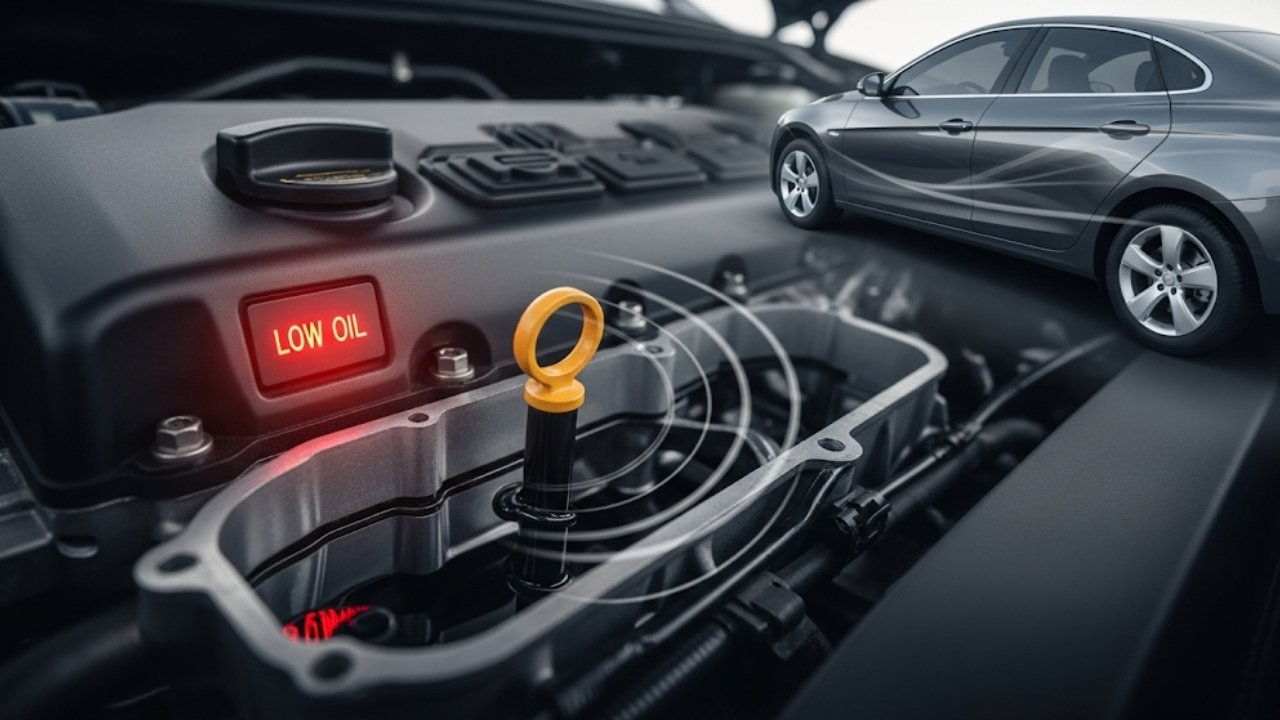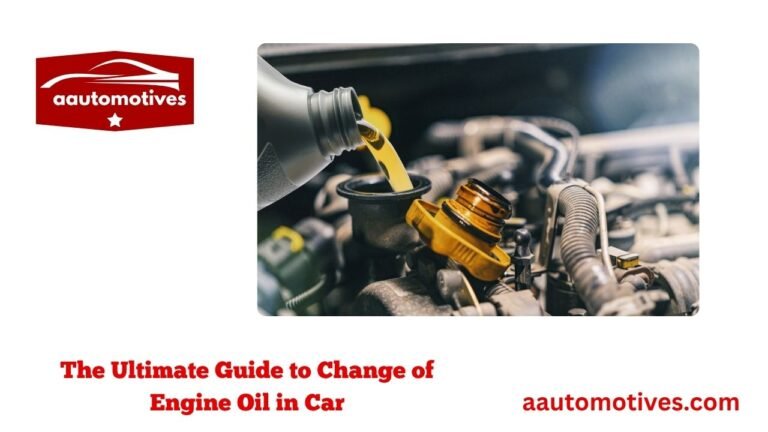Can Low Oil Cause a Car to Shake?

Imagine this. You’re cruising down a familiar road, maybe your daily route to work or a weekend drive to see family. The music is playing, coffee in hand, and then… your steering wheel starts to tremble, your seat vibrates, and suddenly your calm ride turns into a mystery.
You ask yourself, Why is my car shaking? You think it could be bad tires or the suspension, but here’s a question many overlook—can low oil cause a car to shake?
The short answer is: Yes, it can. But let’s not stop there. In this guide, we’ll break down the emotional and mechanical journey of what happens when your car runs low on oil—and why it might feel like your vehicle is begging you for help.
The Role of Engine Oil: The Heartbeat of Your Vehicle

When your engine runs with too little oil, it’s like your body trying to sprint without enough oxygen. Things start heating up. Parts grind against each other. Friction increases. And yes—your car can shake.
Here’s what proper oil does:
-
Reduces friction between engine components
-
Absorbs excess heat from combustion
-
Cleans out microscopic debris and metal shavings
-
Creates a smooth, sealed environment for moving parts
When oil is low, these tasks are left undone—and your car responds with vibrations, hesitation, or even jerking.
Signs Your Car is Shaking Due to Low Oil
Let’s get real. Shaking can come from a dozen different issues. But how can you tell if it’s actually from low oil? Watch out for these symptoms:
-
Vibration when idling
-
Trembling when accelerating
-
Burning oil smell
-
Loud knocking sounds from engine
-
Warning oil light blinking or glowing
These signs aren’t just mechanical issues—they’re cries for help. And you shouldn’t ignore them.
How Low Oil Triggers Shaking: A Deeper Look
Now let’s go deeper and really understand the connection between oil and shaking.
Friction Overload
Without enough oil, your engine loses its silky smooth operation. Pistons, valves, and bearings begin to rub metal-on-metal, which causes tiny vibrations that eventually reach your steering wheel and seats.
Overheating Danger
Oil helps cool the engine. When it’s low, heat builds up fast. Metal expands, parts don’t move freely, and you feel harsh jerking or shaking, especially at higher speeds or under load.
⚙️ Imbalanced Engine Components
A lack of lubrication can cause engine misfires. When one cylinder doesn’t fire right, the entire engine stumbles—and that uneven motion causes the shake.
A Real Story: My Uncle’s Shaky Drive to the Village
Let me tell you a story that brings this to life.
My uncle once drove from Dhaka to Barisal in his trusty Toyota Corolla. On the ferry, he noticed the car was idling rough—almost like a weak heartbeat. He brushed it off. But as soon as he hit the highway, the car began shaking violently, especially on acceleration.
Turns out, he hadn’t checked the oil in months. The dipstick was dry. After adding oil, the shaking reduced instantly—like giving water to a thirsty soul. The engine still needed a little TLC, but the oil saved it from total disaster.
Common Misconceptions About Car Shaking
Let’s bust a few myths real quick.
| Myth | Truth |
|---|---|
| Low oil doesn’t cause shaking | It can, through misfires, friction, and overheating |
| Only tires and suspension cause vibration | Engine problems, especially oil issues, can cause serious shaking |
| You only need to check oil once a year | Check it monthly or before long trips |
| New cars don’t need oil checks | Even brand new engines can burn or leak oil |
Bullet Summary: How Low Oil Makes Your Car Shake
Here’s a quick recap of how low oil causes your car to shake:
-
Friction increases = internal vibration
-
Engine overheats = expansion, misfire, and jerking
-
Oil pressure drops = erratic engine timing
-
Valve lifters collapse = uneven combustion
If your car is shaking, don’t just blame tires or alignment. Check your oil first.
Other Causes of Car Shaking vs. Low Oil Symptoms
It’s not always low oil—but it’s often related or combined with other issues. Let’s compare:
| Cause | Feels Like | Related to Oil? |
|---|---|---|
| Unbalanced tires | Shaking at high speed | ❌ |
| Warped brake rotors | Vibration when braking | ❌ |
| Loose engine mount | Constant vibration | ❌ |
| Low oil level | Engine jerking, idling rough | ✅ |
| Clogged oil filter | Weak acceleration | ✅ |
| Misfires from low oil pressure | Shaking during acceleration | ✅ |
Why You Should Never Drive with Low Oil
If you’re thinking “It’s just a little shake; I’ll top up the oil next week,” stop right there.
Driving with low oil is like jogging on a sprained ankle. You may get by for a while, but the damage piles up. Permanent engine damage can cost thousands of dollars—far more than a bottle of oil.
Risks include:
-
Seized engine
-
Blown head gasket
-
Bent pistons or rods
-
Total engine replacement
How to Prevent Shaking from Low Oil in the First Place
You don’t need to be a mechanic to keep your car happy. A few simple habits can prevent low oil from ever becoming a headache. Here’s what I personally do—and what you should too.
️ 1. Check Oil Regularly (Every 2-3 Weeks)
Pop the hood, grab a tissue, and check the dipstick. Wipe it, dip it, and inspect the level and color. If it’s low or blackened, you need a top-up or change.
2. Stick to Your Oil Change Schedule
Every car has its rhythm. Some cars need oil changes every 3,000 miles, others every 7,500. Read your owner’s manual, or ask your mechanic. Don’t guess.
3. Use the Right Oil Type
Using the wrong oil viscosity can reduce engine efficiency and cause overheating. Whether it’s 5W-30 or 10W-40, stick to what your engine was designed for.
⚠️ 4. Watch for Leaks and Smells
If you smell burning oil or see dark spots under your parked car, don’t wait. A small leak today could mean shaking and smoking tomorrow.
5. Listen to Your Engine
Engines have moods. If it sounds louder than usual, knocks, or vibrates—you may be running low on oil. Always investigate strange behavior quickly.
Emotional Angle: Don’t Ignore the Small Signals
Think of your car like a friend. When it starts to shake, it’s not being difficult—it’s telling you something. It’s like when a loved one has a cough. You don’t wait for it to turn into pneumonia, right?
Just like humans thrive on care, engines thrive on oil. Don’t treat that little red oil light like background noise. It’s not just a warning—it’s a plea for help.
The Cost of Ignoring Low Oil: Let’s Talk Numbers
You might think skipping a $50 oil change is no big deal, but here’s what neglect can cost you:
| Damage | Repair Cost Estimate |
|---|---|
| Seized engine | $3,000 – $8,000 |
| Cracked pistons | $2,000 – $4,000 |
| Full engine rebuild | $4,000 – $10,000 |
| Blown head gasket | $1,000 – $2,000 |
| Valve damage | $500 – $2,000 |
See? Spending a little now can save thousands later. It’s like skipping water to save time, and ending up in the ER.
Cultural Tip: In South Asia, We Often Rely on Mechanics—But Take the First Step Yourself
In places like Bangladesh, India, or Pakistan, it’s common to rely heavily on mechanics. But here’s the thing—if you catch low oil before the damage happens, you’ll save money, time, and stress.
Checking your oil isn’t just for gearheads. It’s something every driver—young, old, male, female—can and should do. Think of it like checking your own blood pressure.
FAQs About Can Low Oil Cause a Car to Shake
Here are some frequently asked questions to clarify your doubts:
1. Can low oil cause a car to shake when idle?
Yes. Lack of lubrication creates friction, making the engine rough and shaky even when you’re not moving.
2. Will topping up the oil immediately stop the shaking?
If oil level was the main cause, then yes—adding oil may calm the engine. But long-term damage needs repairs.
3. Is it safe to drive a shaking car to the mechanic?
If the shaking is violent or oil light is on—don’t risk it. Tow the car instead.
4. Can a car shake due to low oil pressure?
Absolutely. Low oil pressure can mess with engine timing, making cylinders misfire or run unevenly. That’s what causes the shake.
5. Is it safe to just top off oil instead of changing it?
Topping off helps temporarily. But dirty oil loses its power to lubricate. Full changes keep your engine clean and strong.
6. Can low oil damage spark plugs and cause vibration?
Yes. Without enough oil, the engine may run hot and foul the spark plugs, leading to rough idling and shaking.
7. How often should I change my oil to prevent engine vibration?
Follow your manual—typically every 3,000 to 7,500 miles. If you drive in heavy traffic or extreme weather, do it more often.
8. Can synthetic oil reduce the chance of engine vibration?
Yes. Synthetic oil resists breakdown better than conventional oil and keeps the engine cooler—leading to smoother performance.
Conclusion: Don’t Let a Small Thing Become a Big Problem
So—can low oil cause a car to shake?
Yes. It absolutely can.
But now you know why, how, and what to do about it.
Your car is more than just metal—it’s your morning ride, your weekend adventure, your late-night emergency buddy. Taking care of it isn’t just maintenance—it’s respect.
All it takes is two minutes every couple of weeks to check your oil. In return, you’ll get a smoother, safer, longer-lasting ride.
So the next time your car starts to shake—before you panic, pop the hood.





